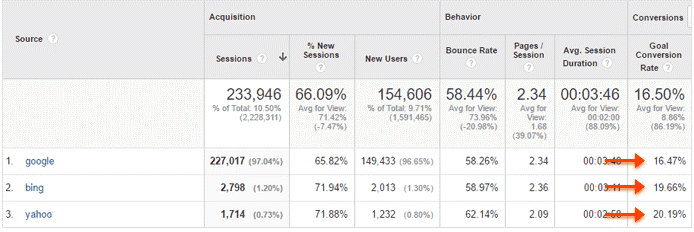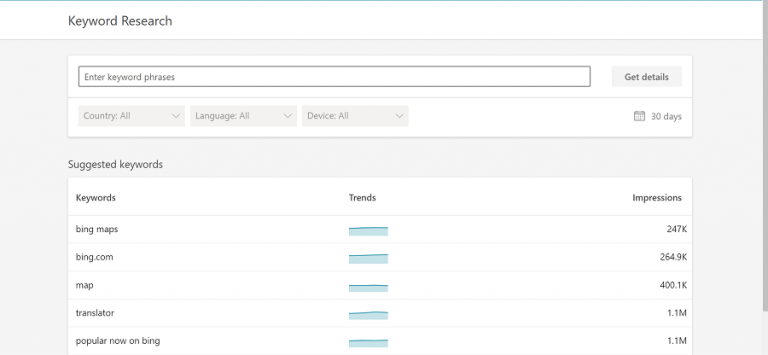If Bing is treated as a punchline in your digital marketing circles, you may be missing out on your business’s greatest untapped opportunity.
Some tend to forget that search engines other than Google exist, but Bing can be a great place to gain visibility online.
Bing and Yahoo (which has been powered by Bing since 2010) together dominate 9.97% of the desktop search engine market share in the U.S.
And, more importantly, many marketers have noted that Bing traffic converts better than Google traffic.
This might have something to do with Bing’s average demographic being more mature and arguably having more money to spend.
 Screenshot from: analytics.google.com, November 2017.
Screenshot from: analytics.google.com, November 2017.
Bing also partners with dozens of other search engines, including Yahoo!, AOL, DuckDuckGo, Ecosia, MSN, and Lycos.
In short, if you’re not searching on Google, you’re likely using a search experience that’s partially powered by Bing.
This doesn’t include voice search (Alexa and Cortana both use Bing) and the fact that Bing is built into most Microsoft products, including Microsoft Office and the Xbox, either.
The good news is that if you’ve already invested in Google SEO, then you’re just a hop, skip, and a jump away from seeing tangible results on other search engines, as well. That’s because Bing and Google share many of the same ranking signals.
Even so, there are key differences between SEO for Google and Bing – and you’re going to learn about those here.
1. Keywords
While Bing announced in 2014 that they no longer consider meta keywords for ranking purposes, search engines like Yandex and Baidu still do.
Google has worked to improve search accuracy by understanding searcher intent and interpreting contextual cues from different websites.
We call this semantic search, which in part relies on machine learning and artificial intelligence (such as RankBrain) to help them understand a page’s content.
Google has said that RankBrain is the third most important factor in its ranking algorithm. This means that exact match keywords don’t matter nearly as much as creating comprehensive topical pages and articles for your visitors.
Bing has been catching up when it comes to broad-matching keywords.
Their Webmaster Guidelines advise you to “Develop rich content based on keyword research that shows what search users the information they are looking for.”
Bing’s Webmaster Guidelines are explicit about how Keywords can help you rank. Bing won’t rule out the possibility of using the meta keywords tag (which Google ignores).
Now, this doesn’t give you an excuse to abuse them or to start stuffing irrelevant keywords into the meta tag. But it does mean you shouldn’t neglect them entirely.
Bing also has a ton of keyword tools to help SEO pros, and you’ll find more detail than in some Google tools.
In Bing Webmaster Tools, they have a powerful keyword tool that shows you trends and related/suggested keywords. Bing even shows relevant ranking URLs.
 Screenshot from: bing.com/webmasters/help, May 2021.
Screenshot from: bing.com/webmasters/help, May 2021.
Google: Create comprehensive pages backed by keyword research, but focus on topical relevance instead of exact match keywords.
Bing: Use straightforward keywords that exactly match the terms you’re targeting in Bing’s search results – just don’t over-optimize. Use their tools to help with other search engines.
2. Backlinks
Both Google and Bing are big on trust. They both value backlinks, for example, because these are signs that visitors found your content useful, trust the information you’ve provided, and now want to share it with others.
Google gauges trust by measuring the PageRank (the link equity flowing through backlinks) of domains linking to your content. High-PageRank links are weighted heavily, and a few of those are worth way more than hundreds of spammy, low-PageRank links.
Bing also values high-quality links, but they judge quality slightly differently. Backlinks aren’t above all other ranking factors, for Bing. They prefer backlinks from quality sites in smaller quantities.
Like Google, Bing also likes internal links with relevant anchor text.
On top of this – Bing removes pages from their index if they don’t have enough links, and doesn’t penalize buying links:
“That said, buying a link on a busy website can bring you direct traffic, so it does remain a valid marketing tactic.”
Again, be careful with this technique, as Bing says:
“Manipulating inbound links to artificially inflate the number of links pointed at a website can lead to your site being delisted from Bing index.”
Google: Authoritative backlinks and high-quality content are the most important indicators of a page’s authority when it comes to backlinks.
Bing: Fewer, more authoritative backlinks are very important, as are internal links with highly relevant anchor text.
3. Social Signals
Google has long denied that social signals play a special role in page ranking, despite a lot of speculation that it plays some small role.
Bing, on the other hand, has historically been very open about the importance of social signals:
“Social media plays a role in today’s effort to rank well in search results. The most obvious part it plays is via influence. If you are influential socially, this leads to your followers sharing your information widely, which in turn results in Bing seeing these positive signals. These positive signals can have an impact on how you rank organically in the long run.“
If you want to rank well on Bing, then you’re going to need to keep an ear to the ground in your social media circles.
Baking social media into your SEO strategy is time-consuming, but well worth it if you want to optimize for Bing. Consider downloading a comprehensive social media listening tool that will help you find and tap into every conversation people are having about your business on the web.
Bing also offers an API to check out what’s trending on social media.
Google: Treats Facebook and Twitter pages like any other indexed pages.
Bing: Social signals are a key ranking factor. Search results will show you your Facebook friends’ and Twitter followers’ ratings of different businesses.
4. Multimedia Content
Bing’s been pushing the envelope when it comes to visual search, which goes hand-in-hand with one of their most touted features — “entity understanding.”
Essentially, Bing has the ability to accurately crawl and understand various types of multimedia content, such as video, audio, and images.
In a lot of ways, Bing is leading the pack with regards to visual search. When Flash was a thing, Bing could crawl and index Flash sites just fine.
Use high-quality images, and optimize them to help load time.
Meanwhile, Google still relies most heavily on text-based content. High-quality images and videos do matter, but they aren’t weighted nearly as heavily as they are for Bing.
Google: Emphasizes text-based content.
Bing: More emphasis on multimedia content.
5. Other Technical SEO Differences
While the four differences listed above are probably the biggest differences separating Google and Bing, there are still some other small discrepancies that I should note.
For example, while you can generally rely on Google to index your website and trust that it will try to crawl and index every page of your site, Bing tends to focus on key pages and crawls your pages more infrequently.
Fortunately, you can help this process along by increasing your crawl rate using your Bing Webmaster Tools and clicking Crawl Control.
You can also submit your sitemap to Bing by clicking Submit a Sitemap in your Webmaster Tools or by including a path to it in your robots.txt—an important step, given that this is a ranking signal.
Another benefit to Bing is its API. It allows users to submit URLs to be crawled in bulk, something Google doesn’t have.
In general, Bing is excited to help people rank and has a lot of tools to help you.
For more examples of technical factors that differ from Google, check out Bing’s Webmaster Guidelines.
More Bing SEO Resources Here:
Featured Image: Aleh Barysevich/Search Engine Journal
from WordPress https://ift.tt/7RyugYzL9
via IFTTT

No comments:
Post a Comment